2011年《随堂优化训练》英语 新课标北师大版 必修5 unit 13 people lesson 3 making guesses about people [配套课件]
文档属性
| 名称 | 2011年《随堂优化训练》英语 新课标北师大版 必修5 unit 13 people lesson 3 making guesses about people [配套课件] | 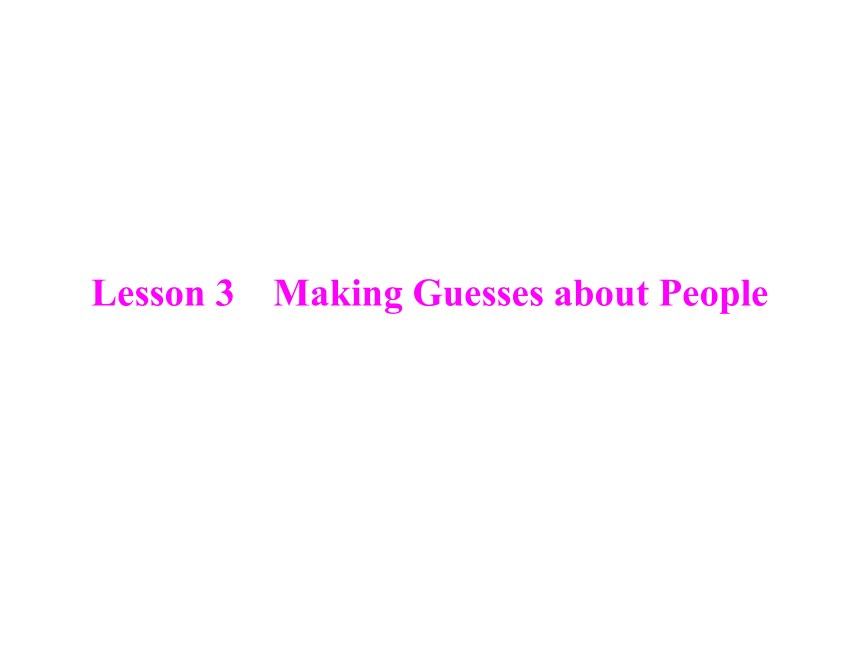 | |
| 格式 | rar | ||
| 文件大小 | 186.5KB | ||
| 资源类型 | 教案 | ||
| 版本资源 | 北师大版 | ||
| 科目 | 英语 | ||
| 更新时间 | 2011-07-17 21:26:37 | ||
图片预览

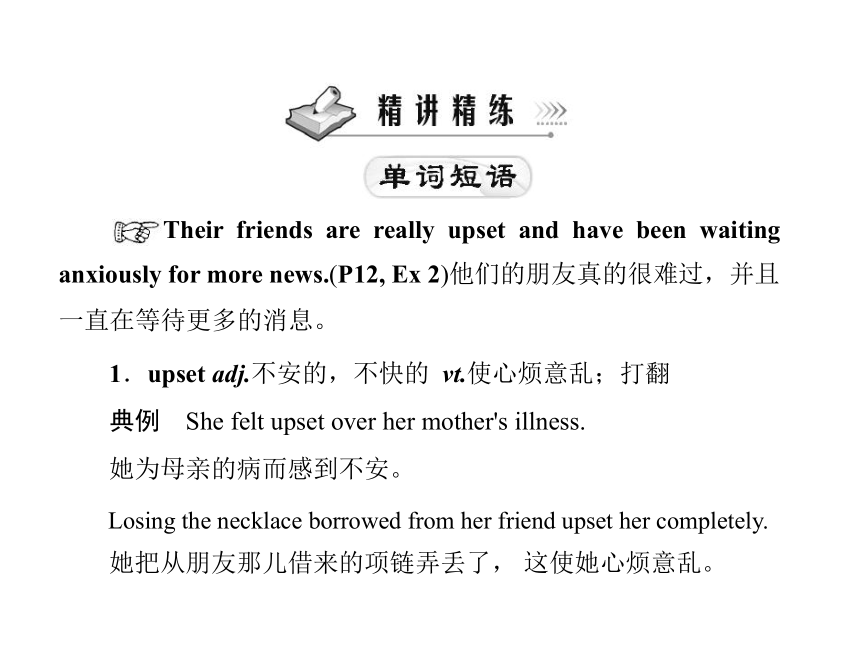
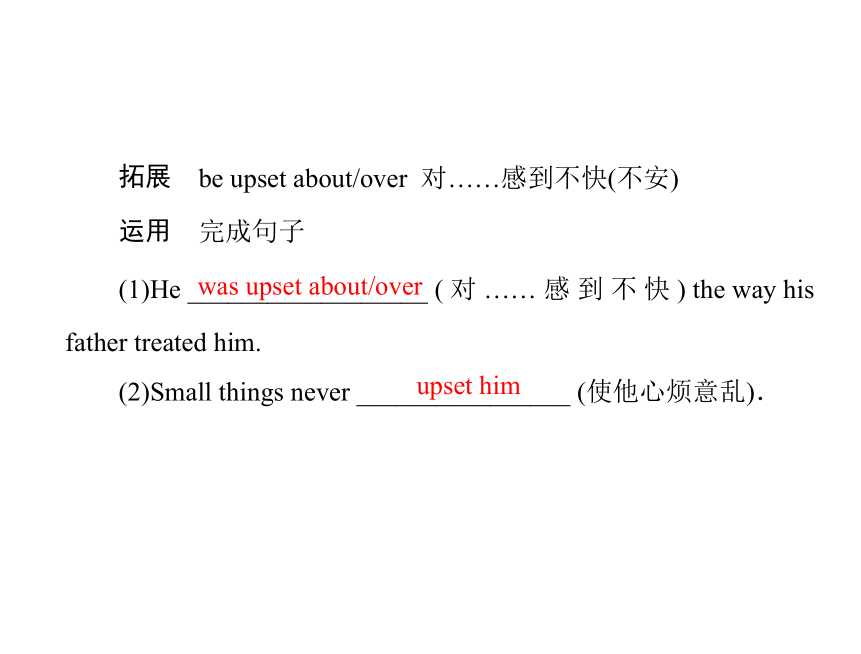
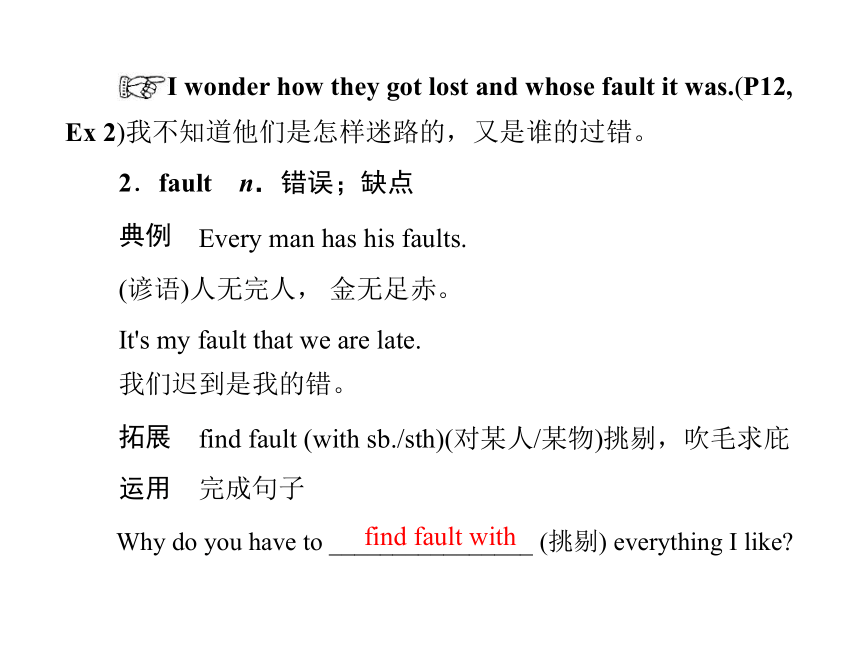
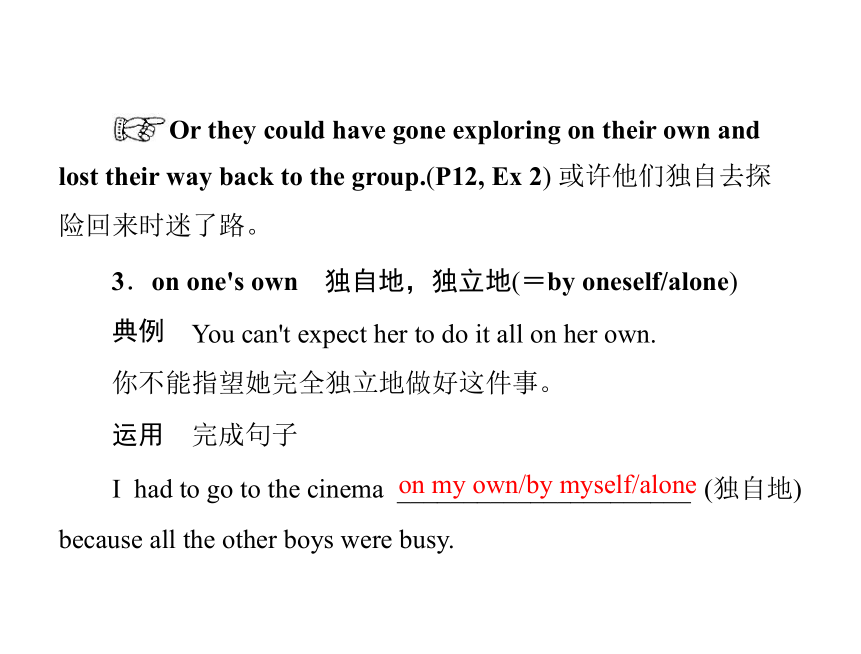
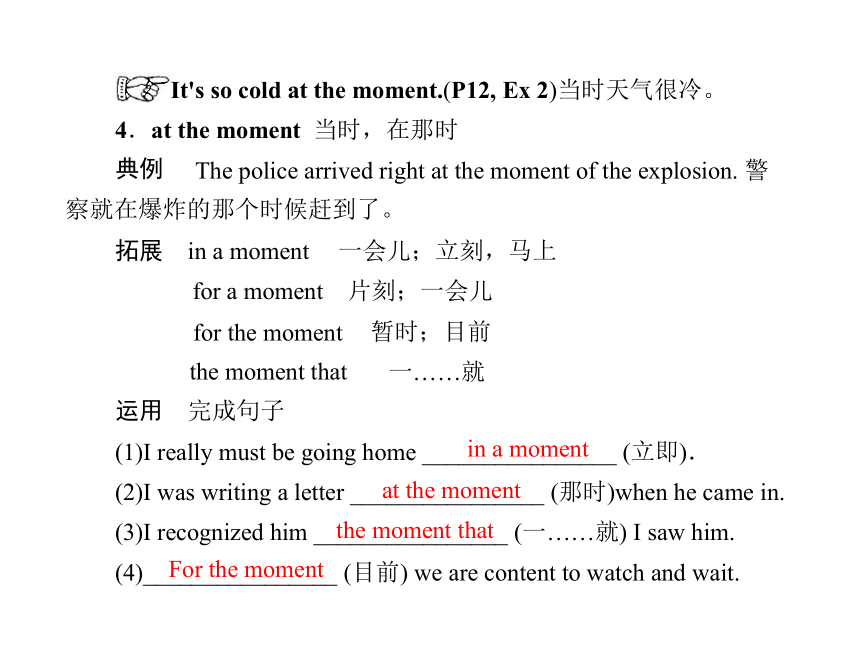
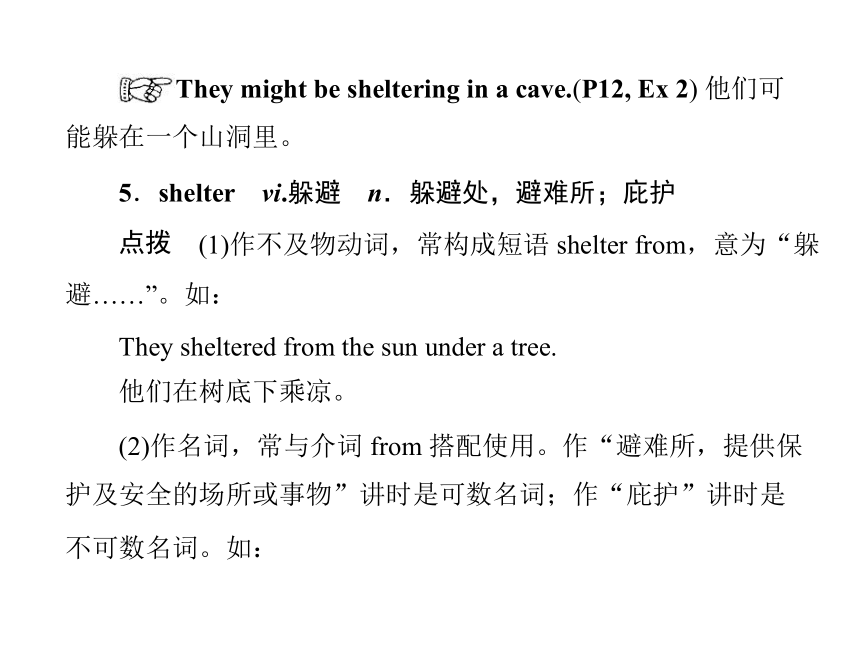
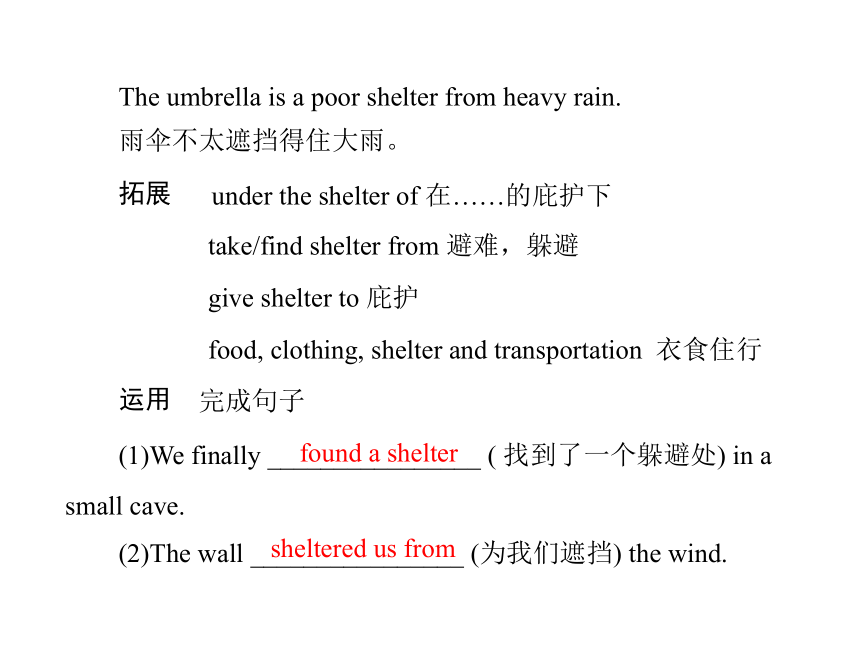
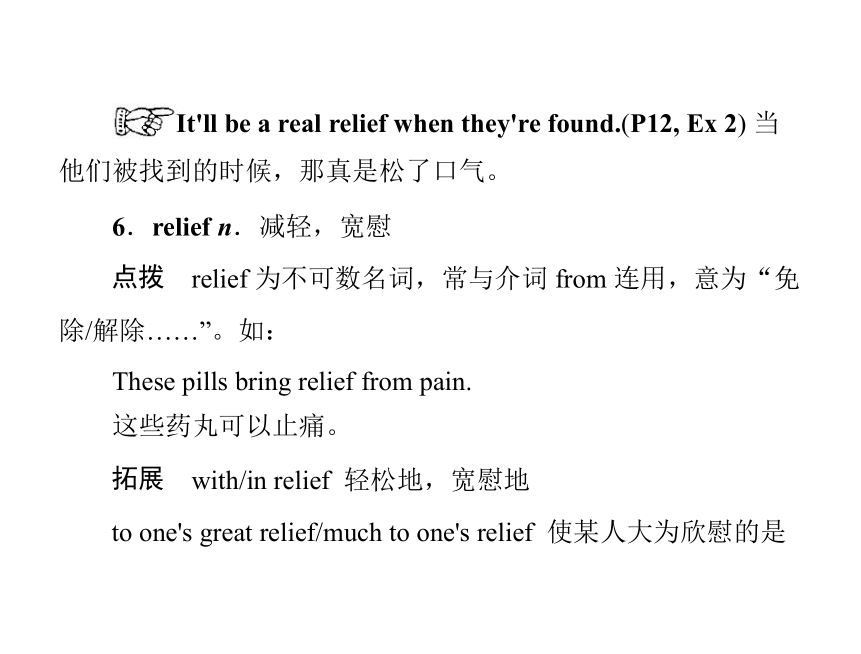
文档简介
(共23张PPT)
Lesson 3
Making Guesses about People
Their friends are really upset and have been waiting
anxiously for more news.(P12, Ex 2)他们的朋友真的很难过,并且
一直在等待更多的消息。
1.upset adj.不安的,不快的 vt.使心烦意乱;打翻
典例 She felt upset over her mother's illness.
她为母亲的病而感到不安。
Losing the necklace borrowed from her friend upset her completely.
她把从朋友那儿借来的项链弄丢了, 这使她心烦意乱。
拓展
运用
be upset about/over 对……感到不快(不安)
完成句子
(1)He __________________ ( 对 …… 感 到 不 快 ) the way his
father treated him.
(2)Small things never ________________ (使他心烦意乱).
upset him
was upset about/over
I wonder how they got lost and whose fault it was.(P12,
Ex 2)我不知道他们是怎样迷路的,又是谁的过错。
2.fault n.错误;缺点
典例
Every man has his faults.
(谚语)人无完人, 金无足赤。
It's my fault that we are late.
我们迟到是我的错。
拓展
运用
find fault (with sb./sth)(对某人/某物)挑剔,吹毛求庇
完成句子
Why do you have to ________________ (挑剔) everything I like
find fault with
Or they could have gone exploring on their own and
lost their way back to the group.(P12, Ex 2) 或许他们独自去探
险回来时迷了路。
3.on one's own
独自地,独立地(=by oneself/alone)
典例
You can't expect her to do it all on her own.
你不能指望她完全独立地做好这件事。
运用
完成句子
I had to go to the cinema ______________________ (独自地)
because all the other boys were busy.
on my own/by myself/alone
It's so cold at the moment.(P12, Ex 2)当时天气很冷。
4.at the moment 当时,在那时
典例
The police arrived right at the moment of the explosion. 警
察就在爆炸的那个时候赶到了。
拓展 in a moment
一会儿;立刻,马上
for a moment 片刻;一会儿
for the moment
the moment that
暂时;目前
一……就
运用 完成句子
(1)I really must be going home ________________ (立即).
(2)I was writing a letter ________________ (那时)when he came in.
(3)I recognized him ________________ (一……就) I saw him.
(4)________________ (目前) we are content to watch and wait.
in a moment
at the moment
For the moment
the moment that
They might be sheltering in a cave.(P12, Ex 2) 他们可
能躲在一个山洞里。
5.shelter vi.躲避
n.躲避处,避难所;庇护
点拨
(1)作不及物动词,常构成短语 shelter from,意为“躲
避……”。如:
They sheltered from the sun under a tree.
他们在树底下乘凉。
(2)作名词,常与介词 from 搭配使用。作“避难所,提供保
护及安全的场所或事物”讲时是可数名词;作“庇护”讲时是
不可数名词。如:
The umbrella is a poor shelter from heavy rain.
雨伞不太遮挡得住大雨。
拓展
运用
under the shelter of 在……的庇护下
take/find shelter from 避难,躲避
give shelter to 庇护
food, clothing, shelter and transportation 衣食住行
完成句子
(1)We finally ________________ ( 找到了一个躲避处) in a
small cave.
sheltered us from
(2)The wall ________________ (为我们遮挡) the wind.
found a shelter
It'll be a real relief when they're found.(P12, Ex 2) 当
他们被找到的时候,那真是松了口气。
6.relief n.减轻,宽慰
点拨
relief 为不可数名词,常与介词 from 连用,意为“免
除/解除……”。如:
These pills bring relief from pain.
这些药丸可以止痛。
拓展
with/in relief 轻松地,宽慰地
to one's great relief/much to one's relief 使某人大为欣慰的是
运用
完成句子
(1)Both men seemed to sigh ( 叹 息 ) ___________________
(轻松地).
(2)_______________________________ ( 让我们感到非常欣慰
的是), all the children returned safely.
with/in relief
To our great relief/Much to our relief
A mother is telling her son off.(P13, Ex 8) 一位母亲正
在责备她的儿子。
7.tell...off 责备,斥责
点拨
该短语中的 off 为副词,属于“动副短语”,后接代
词作宾语时须置于动词和副词之间。如:
My teacher always tells me off, which makes me unhappy. 我
的老师总是责备我,这让我很不快。
运用
完成句子
You shouldn't ________________ (责备我) like this.In fact, it
is your fault.
tell me off
They can't exactly eat seeds like squirrels and sparrows do!
(P12, Ex 2)他们根本不可能像松鼠和麻雀一样吃种子。
点拨 like 在此作连词,意为“如同”,引导方式状语从句。如:
I hope I can drive the car like you do.
我希望我开车开得像你一样好。
运用
完成句子
He followed his brother and jumped across the small stream
________________ (像他一样).
like he did
情态动词表示“猜测”
英语中,情态动词 can/could, must, may/might, would, should 等
都可以表示“猜测”。具体用法如下:
一、“情态动词+do”用于对现在或将来情况的猜测
“情态动词+be (doing)”用于对此时此刻正在发生的事情的
猜测
1.must 表示十分肯定的猜测,只用于肯定句中,且很少用于对
将来情况的猜测。如:
Mr.Li must be working now, for the lights in his office are still on.
李先生现在一定在工作,因为他办公室的灯还亮着。
2.“will/would+do”表示对将来或有可能出现的情况的
猜测,语气较强,常有客观依据。would 表示猜测时,不一定
是 will 的过去时,而是表示说话者的语气要委婉一些。如:
He will come if he's free.如果有空他明天会来的。
He would come here if the weather were fine.
如果天气好,他可能会来这里。
3.should (有时用 ought to)表示猜测的可能性比较大,仅比
must 的可能性小一点,可译为“很可能,按理应该”。如:
It is already 10 o'clock now; they should be there.
现在已经十点钟了。他们应该已经到了那里。
4.can/could 表猜测时语气比 should 弱,could 不一定是 can
的过去时,而经常表示比 can 更为委婉的语气。
(1)用于肯定句中时表示一种理论上的可能性,即“有可能发
生,但实际未必发生”,往往有“不时,有时”的含义。如:
Even experts can make mistake.
即使是专家也有可能犯错。
Reading could be very boring.
有时阅读也可能是很枯燥的。
注意:一般不用“can+do”表示对将来的猜测,但可用“could
+do”表示对将来的猜测。如:
We could pay a visit to Hainan next month.
下个月我们可能去海南观光。
(2)用于否定句中时,can't 相当于 must 的反义词,表示“肯
定不”,couldn't 则语气弱些。如:
She's still single.That man can't/couldn't be her husband. 她还
单身,那人不可能是她的丈夫。
5.may/might 表猜测时可能性最小,常指一种没有客观依
据的猜测;might 表示猜测时不一定是 may 的过去时,而表示可
能性比 may 要小。如:
The man may/might be waiting for you.
那个人可能正在等你。
二、“情态动词+have done”表示对过去情况的猜测
1.must have done 表示对过去发生的事情的十分肯定的猜
测,只用于肯定句,意为“过去肯定做了某事”,不存在 mustn't
have done 这种形式。如:
The ground is rather wet, so it must have rained last night,
didn't it?地面很湿,昨晚肯定下了雨,对吗?
2.should have done 表示“过去应该做了某事”,语气较强,
对猜测的把握较大,常有客观依据。如:
The train should have already left.
火车大概已经开走了吧。
3.can/could have done 表猜测时一般用在疑问句或否定句
中,对可能性进行提问,或表示不相信或怀疑的态度,对猜测
的把握很大。如:
Can/Could he have passed the exam
他可能通过考试了吗?
I think that he couldn't/can't have gone abroad.I saw him just
now.我认为他不可能出国了,我刚才还看见他了。
4.may/might have done 表示“过去可能做了某事”,对猜
测的把握较小,不用于疑问句中。may 比 might 的把握稍大些。
may/might not have done 表示“过去可能没有做某事”。如:
John may/might not have passed the exam; he looks very sad.
约翰可能没有通过考试,他看起来很忧伤。
注意:“情态动词+have done”还可以用于虚拟语气中,
通常表示惋惜、责备等语气。如:
(1)should/ought to have done 表示“过去本应该做某事却未
做”;其否定结构为 shouldn't/oughtn't to have done,表示“过去
本不该做某事却做了”。如:
You shouldn't/oughtn't to have gone to bed again when you
woke up at five.当五点钟醒的时候,你本不该再睡的。
(2)could have done 表示“过去本能够做某事却未做”;其否定
形式 couldn't have done 没有虚拟语气的用法,只表示猜测。如:
He could have finished it on schedule, but somehow he fell
behind.
他原本能按预定进度做完这件事的,但不知怎地却落后了。
(3)need have done 表示“过去本有必要做某事却未做”;
其否定形式为 needn't have done,表示“过去本没必要做某事却
做了”。如:
Your home is not far from your school, so you needn't have
left in such a hurry.
你家离学校很近,所以你本不必那么匆忙就离开的。
一、同义句转换
1.I am sure she is relaxing in her room.
She ________________ in her room.
2.Perhaps the plane arrived late, and that is why they are not
here.
The plane____________________ late, and that is why they are not
here.
3.I do not believe you failed the exam.
You _____________________the exam.
must be relaxing
may/might have arrived
can't/couldn't have failed
4.It is possible that Sam doesn't like classical music.
Sam________________ classical music.
5.Maybe they lied to me about their adventure.
They__________________ to me about their adventure.
6.It is quite probable that Bill did not win the competition.
Bill________________ the competition.
may/might have lied
couldn't have won
二、完成句子
1.My dictionary has disappeared.Who________________ (可
能拿了呢)
2 .My sister met him at the station yesterday morning, so he
__________________________________ (不可能去听了你的演讲).
may/might not like
could have taken it
can't/couldn't have attended your lecture
3.I have lost one of my gloves.I ___________________________
(一定是把它丢在某个地方了).
4.—She looks very happy.She __________________________
(考试肯定及格了).
—I guess so.It's not difficult after all.
5.It's nearly seven o'clock.Jack ________________ (该来了)
at any moment.
should be here
must have dropped it somewhere
must have passed the exam
Lesson 3
Making Guesses about People
Their friends are really upset and have been waiting
anxiously for more news.(P12, Ex 2)他们的朋友真的很难过,并且
一直在等待更多的消息。
1.upset adj.不安的,不快的 vt.使心烦意乱;打翻
典例 She felt upset over her mother's illness.
她为母亲的病而感到不安。
Losing the necklace borrowed from her friend upset her completely.
她把从朋友那儿借来的项链弄丢了, 这使她心烦意乱。
拓展
运用
be upset about/over 对……感到不快(不安)
完成句子
(1)He __________________ ( 对 …… 感 到 不 快 ) the way his
father treated him.
(2)Small things never ________________ (使他心烦意乱).
upset him
was upset about/over
I wonder how they got lost and whose fault it was.(P12,
Ex 2)我不知道他们是怎样迷路的,又是谁的过错。
2.fault n.错误;缺点
典例
Every man has his faults.
(谚语)人无完人, 金无足赤。
It's my fault that we are late.
我们迟到是我的错。
拓展
运用
find fault (with sb./sth)(对某人/某物)挑剔,吹毛求庇
完成句子
Why do you have to ________________ (挑剔) everything I like
find fault with
Or they could have gone exploring on their own and
lost their way back to the group.(P12, Ex 2) 或许他们独自去探
险回来时迷了路。
3.on one's own
独自地,独立地(=by oneself/alone)
典例
You can't expect her to do it all on her own.
你不能指望她完全独立地做好这件事。
运用
完成句子
I had to go to the cinema ______________________ (独自地)
because all the other boys were busy.
on my own/by myself/alone
It's so cold at the moment.(P12, Ex 2)当时天气很冷。
4.at the moment 当时,在那时
典例
The police arrived right at the moment of the explosion. 警
察就在爆炸的那个时候赶到了。
拓展 in a moment
一会儿;立刻,马上
for a moment 片刻;一会儿
for the moment
the moment that
暂时;目前
一……就
运用 完成句子
(1)I really must be going home ________________ (立即).
(2)I was writing a letter ________________ (那时)when he came in.
(3)I recognized him ________________ (一……就) I saw him.
(4)________________ (目前) we are content to watch and wait.
in a moment
at the moment
For the moment
the moment that
They might be sheltering in a cave.(P12, Ex 2) 他们可
能躲在一个山洞里。
5.shelter vi.躲避
n.躲避处,避难所;庇护
点拨
(1)作不及物动词,常构成短语 shelter from,意为“躲
避……”。如:
They sheltered from the sun under a tree.
他们在树底下乘凉。
(2)作名词,常与介词 from 搭配使用。作“避难所,提供保
护及安全的场所或事物”讲时是可数名词;作“庇护”讲时是
不可数名词。如:
The umbrella is a poor shelter from heavy rain.
雨伞不太遮挡得住大雨。
拓展
运用
under the shelter of 在……的庇护下
take/find shelter from 避难,躲避
give shelter to 庇护
food, clothing, shelter and transportation 衣食住行
完成句子
(1)We finally ________________ ( 找到了一个躲避处) in a
small cave.
sheltered us from
(2)The wall ________________ (为我们遮挡) the wind.
found a shelter
It'll be a real relief when they're found.(P12, Ex 2) 当
他们被找到的时候,那真是松了口气。
6.relief n.减轻,宽慰
点拨
relief 为不可数名词,常与介词 from 连用,意为“免
除/解除……”。如:
These pills bring relief from pain.
这些药丸可以止痛。
拓展
with/in relief 轻松地,宽慰地
to one's great relief/much to one's relief 使某人大为欣慰的是
运用
完成句子
(1)Both men seemed to sigh ( 叹 息 ) ___________________
(轻松地).
(2)_______________________________ ( 让我们感到非常欣慰
的是), all the children returned safely.
with/in relief
To our great relief/Much to our relief
A mother is telling her son off.(P13, Ex 8) 一位母亲正
在责备她的儿子。
7.tell...off 责备,斥责
点拨
该短语中的 off 为副词,属于“动副短语”,后接代
词作宾语时须置于动词和副词之间。如:
My teacher always tells me off, which makes me unhappy. 我
的老师总是责备我,这让我很不快。
运用
完成句子
You shouldn't ________________ (责备我) like this.In fact, it
is your fault.
tell me off
They can't exactly eat seeds like squirrels and sparrows do!
(P12, Ex 2)他们根本不可能像松鼠和麻雀一样吃种子。
点拨 like 在此作连词,意为“如同”,引导方式状语从句。如:
I hope I can drive the car like you do.
我希望我开车开得像你一样好。
运用
完成句子
He followed his brother and jumped across the small stream
________________ (像他一样).
like he did
情态动词表示“猜测”
英语中,情态动词 can/could, must, may/might, would, should 等
都可以表示“猜测”。具体用法如下:
一、“情态动词+do”用于对现在或将来情况的猜测
“情态动词+be (doing)”用于对此时此刻正在发生的事情的
猜测
1.must 表示十分肯定的猜测,只用于肯定句中,且很少用于对
将来情况的猜测。如:
Mr.Li must be working now, for the lights in his office are still on.
李先生现在一定在工作,因为他办公室的灯还亮着。
2.“will/would+do”表示对将来或有可能出现的情况的
猜测,语气较强,常有客观依据。would 表示猜测时,不一定
是 will 的过去时,而是表示说话者的语气要委婉一些。如:
He will come if he's free.如果有空他明天会来的。
He would come here if the weather were fine.
如果天气好,他可能会来这里。
3.should (有时用 ought to)表示猜测的可能性比较大,仅比
must 的可能性小一点,可译为“很可能,按理应该”。如:
It is already 10 o'clock now; they should be there.
现在已经十点钟了。他们应该已经到了那里。
4.can/could 表猜测时语气比 should 弱,could 不一定是 can
的过去时,而经常表示比 can 更为委婉的语气。
(1)用于肯定句中时表示一种理论上的可能性,即“有可能发
生,但实际未必发生”,往往有“不时,有时”的含义。如:
Even experts can make mistake.
即使是专家也有可能犯错。
Reading could be very boring.
有时阅读也可能是很枯燥的。
注意:一般不用“can+do”表示对将来的猜测,但可用“could
+do”表示对将来的猜测。如:
We could pay a visit to Hainan next month.
下个月我们可能去海南观光。
(2)用于否定句中时,can't 相当于 must 的反义词,表示“肯
定不”,couldn't 则语气弱些。如:
She's still single.That man can't/couldn't be her husband. 她还
单身,那人不可能是她的丈夫。
5.may/might 表猜测时可能性最小,常指一种没有客观依
据的猜测;might 表示猜测时不一定是 may 的过去时,而表示可
能性比 may 要小。如:
The man may/might be waiting for you.
那个人可能正在等你。
二、“情态动词+have done”表示对过去情况的猜测
1.must have done 表示对过去发生的事情的十分肯定的猜
测,只用于肯定句,意为“过去肯定做了某事”,不存在 mustn't
have done 这种形式。如:
The ground is rather wet, so it must have rained last night,
didn't it?地面很湿,昨晚肯定下了雨,对吗?
2.should have done 表示“过去应该做了某事”,语气较强,
对猜测的把握较大,常有客观依据。如:
The train should have already left.
火车大概已经开走了吧。
3.can/could have done 表猜测时一般用在疑问句或否定句
中,对可能性进行提问,或表示不相信或怀疑的态度,对猜测
的把握很大。如:
Can/Could he have passed the exam
他可能通过考试了吗?
I think that he couldn't/can't have gone abroad.I saw him just
now.我认为他不可能出国了,我刚才还看见他了。
4.may/might have done 表示“过去可能做了某事”,对猜
测的把握较小,不用于疑问句中。may 比 might 的把握稍大些。
may/might not have done 表示“过去可能没有做某事”。如:
John may/might not have passed the exam; he looks very sad.
约翰可能没有通过考试,他看起来很忧伤。
注意:“情态动词+have done”还可以用于虚拟语气中,
通常表示惋惜、责备等语气。如:
(1)should/ought to have done 表示“过去本应该做某事却未
做”;其否定结构为 shouldn't/oughtn't to have done,表示“过去
本不该做某事却做了”。如:
You shouldn't/oughtn't to have gone to bed again when you
woke up at five.当五点钟醒的时候,你本不该再睡的。
(2)could have done 表示“过去本能够做某事却未做”;其否定
形式 couldn't have done 没有虚拟语气的用法,只表示猜测。如:
He could have finished it on schedule, but somehow he fell
behind.
他原本能按预定进度做完这件事的,但不知怎地却落后了。
(3)need have done 表示“过去本有必要做某事却未做”;
其否定形式为 needn't have done,表示“过去本没必要做某事却
做了”。如:
Your home is not far from your school, so you needn't have
left in such a hurry.
你家离学校很近,所以你本不必那么匆忙就离开的。
一、同义句转换
1.I am sure she is relaxing in her room.
She ________________ in her room.
2.Perhaps the plane arrived late, and that is why they are not
here.
The plane____________________ late, and that is why they are not
here.
3.I do not believe you failed the exam.
You _____________________the exam.
must be relaxing
may/might have arrived
can't/couldn't have failed
4.It is possible that Sam doesn't like classical music.
Sam________________ classical music.
5.Maybe they lied to me about their adventure.
They__________________ to me about their adventure.
6.It is quite probable that Bill did not win the competition.
Bill________________ the competition.
may/might have lied
couldn't have won
二、完成句子
1.My dictionary has disappeared.Who________________ (可
能拿了呢)
2 .My sister met him at the station yesterday morning, so he
__________________________________ (不可能去听了你的演讲).
may/might not like
could have taken it
can't/couldn't have attended your lecture
3.I have lost one of my gloves.I ___________________________
(一定是把它丢在某个地方了).
4.—She looks very happy.She __________________________
(考试肯定及格了).
—I guess so.It's not difficult after all.
5.It's nearly seven o'clock.Jack ________________ (该来了)
at any moment.
should be here
must have dropped it somewhere
must have passed the exam
